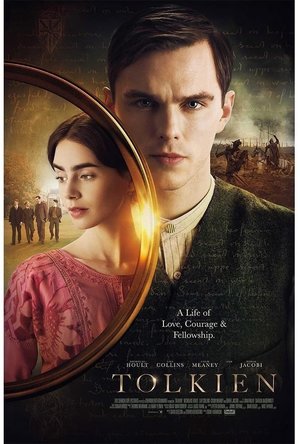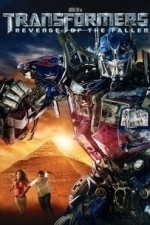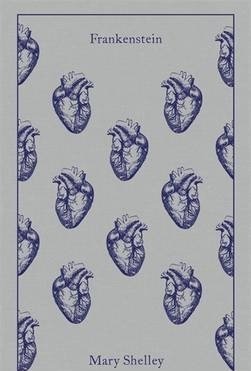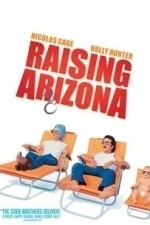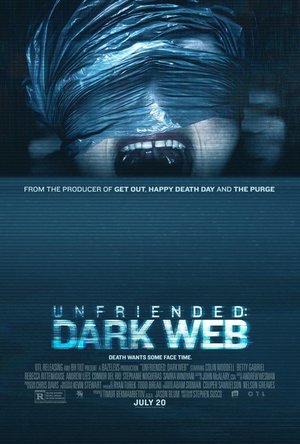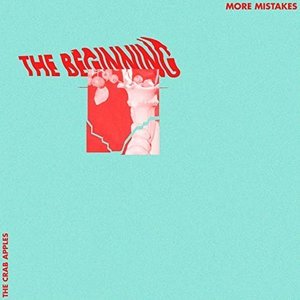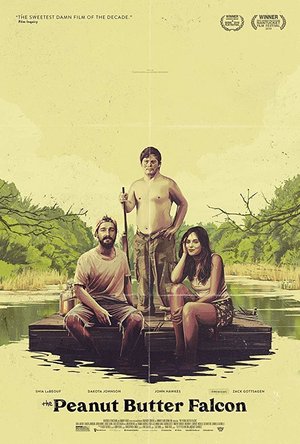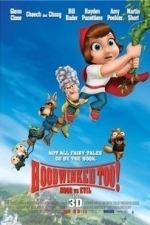Search
Search results
Emma @ The Movies (1786 KP) rated Tolkien (2019) in Movies
Jun 22, 2019 (Updated Sep 25, 2019)
Tolkien shows us a snapshot of the author's younger years from orphan to student, from soldier to scholar. I don't know much about his history but I'm familiar with the estate and I was surprised that this went through without their blessing. Not knowing the background I can't say how much is true and how much is artistic license, and sadly in this instance, I'm really not too bothered about finding out. Other biopics have left me with a desire to find out more about the subject matter but this left me rather indifferent about it.
It's not a wildly exciting life story that's captured in the film, what I found more compelling was the way that the creative process was depicted. The way they used visuals to connect everything in his life to his stories was beautifully done. The war scenes are stunning in their simplicity, seeing the colours against the stark backgrounds was incredible and I love how they managed to weave his visions into them. The mist effect was particularly well done.
I love the idea that Tolkien saw all these ideas in what most people would dismiss as life or a trick of the light. At the beginning of the film we see his mother telling the brother a story with the use of a zoetrope. (I'm not sure it's technically a zoetrope, do let me know what it is if I'm wrong.) The way they managed to create the feeling of life in those projections was mesmerising.
I'm quite aware that I haven't mentioned a single member of the cast yet. To be honest, I think I was so engrossed in the visuals that the rest of it was just kind of... there.
I found it difficult to keep track of who was who in his fellowship. I couldn't have told you their names or their individual niches. In fact, near the end I realised I'd got one of their names wrong the entire way through my notes.
Nicholas Hoult isn't an actor I'm particularly excited for in films, he is a consistent performer but I don't think I've seen anything that's wowed me. As Tolkien thought he did bring some surprisingly emotional elements... I definitely hadn't expected to cry at this screening. If I'd have been Edith in the moment where she asks him to tell her a story I'd have fallen in love with him on the spot, it had me leaning in intrigued to see him working everything out.
Visually, the movie is stunning and the feeling it creates is perfect, but everything else in the film felt very non-descript, and a lot of it seemed like it just had a place to make you link it to his writings. Tolkien is more of a nostalgic trip down memory lane than a biopic.
What you should do
The visuals on the big screen were amazing, but I don't think there's enough going on in the rest of the film to warrant a trip to the cinema for it. Try and catch it when it's available on home release though.
Movie thing you wish you could take home
The ability to create a wall of ideas without getting annoyed that nothing was lined up straight.
It's not a wildly exciting life story that's captured in the film, what I found more compelling was the way that the creative process was depicted. The way they used visuals to connect everything in his life to his stories was beautifully done. The war scenes are stunning in their simplicity, seeing the colours against the stark backgrounds was incredible and I love how they managed to weave his visions into them. The mist effect was particularly well done.
I love the idea that Tolkien saw all these ideas in what most people would dismiss as life or a trick of the light. At the beginning of the film we see his mother telling the brother a story with the use of a zoetrope. (I'm not sure it's technically a zoetrope, do let me know what it is if I'm wrong.) The way they managed to create the feeling of life in those projections was mesmerising.
I'm quite aware that I haven't mentioned a single member of the cast yet. To be honest, I think I was so engrossed in the visuals that the rest of it was just kind of... there.
I found it difficult to keep track of who was who in his fellowship. I couldn't have told you their names or their individual niches. In fact, near the end I realised I'd got one of their names wrong the entire way through my notes.
Nicholas Hoult isn't an actor I'm particularly excited for in films, he is a consistent performer but I don't think I've seen anything that's wowed me. As Tolkien thought he did bring some surprisingly emotional elements... I definitely hadn't expected to cry at this screening. If I'd have been Edith in the moment where she asks him to tell her a story I'd have fallen in love with him on the spot, it had me leaning in intrigued to see him working everything out.
Visually, the movie is stunning and the feeling it creates is perfect, but everything else in the film felt very non-descript, and a lot of it seemed like it just had a place to make you link it to his writings. Tolkien is more of a nostalgic trip down memory lane than a biopic.
What you should do
The visuals on the big screen were amazing, but I don't think there's enough going on in the rest of the film to warrant a trip to the cinema for it. Try and catch it when it's available on home release though.
Movie thing you wish you could take home
The ability to create a wall of ideas without getting annoyed that nothing was lined up straight.
Gareth von Kallenbach (980 KP) rated Transformers Revenge of the Fallen (2009) in Movies
Aug 9, 2019
Following up the success of “Transformers” was not easy task, and thankfully Director Michael Bay and the amazing wizards at Industrial Light and Magic are up to the challenge as “Transformers: Revenge of the Fallen” is the rare sequel that outdoes the original in almost every way.
The film once again stars Shia LaBeouf as Sam Witwicky who is still dating the lovely Mikaela (Megan Fox), as he prepares to head east for college.
Mikaela is unable to head east with Sam as she must stay behind to help her recently paroled father. Sam and his parents head off to his college campus and leave his transforming Camero Bumblebee at home.
At the same time, Optimus Prime (Peter Cullen), and the rest of the heroic Autobots have joined forces with the government in an effort to locate and remove any remaining Decepticon threat. The special unit has worked well for two years as they have not only managed to contain the threat, but have kept their existence on Earth a secret until a mission in Shanghai escalates and has giant robots racing through the streets creating a path of destruction.
The aftermath of the mission causes some in authority to question the need for the Autobots and despite concerns that a major offensive is in the planning, the movements of the team are curtailed.
Sam and Mikaela are soon reunited when a shard from the All Spark is stolen. Sam also starts to have visions of mysterious alien symbols making him the prime target of the recently resurrected Megatron (Hugo Weaving), and his minions.
It is learned that the life essences of the Autobots and Decepticons may have a supply located on Earth and that Megatron will stop at nothing to locate it even if it means destroying the sun and all life on earth in the process.
What follows is a spectacular and extended series of battles which range from the city, to the countryside and deserts and pyramids of Egypt.
The new film has a surprisingly good amount of humor in it, which is needed as the film has a run time of over 2.5 hours and does take its time getting started in the first 40 minutes.
While the plot may be fairly basic and a bit convoluted, the real stars of the film are the action sequences, and Michael Bay ups the ante on explosions, destruction, and robot mayhem. It is clear that a lot of money was spent on the film and it is all up there on the screen. Lavish battles between the robotic forces and the military unfold often and the finale is an extended battle sequences that is amongst the most ambitious and lavish in action film history.
LaBeouf and Fox do the best with their parts even though they are not given much to do except run, jump, and look attractive when they are not interacting with their CGI Co stars.
That being said, the film knows what its audience is as does not try to reinvent what worked so well in the previous film. Instead its focus is on giving you more of what the audience loved and in that we get much more of the robots in combat and more of Megan Fox is skimpy tops and shorts.
The lavish and amazing visuals and action carry the film and establish Transformers as a heavyweight franchise for summers to come.
The film once again stars Shia LaBeouf as Sam Witwicky who is still dating the lovely Mikaela (Megan Fox), as he prepares to head east for college.
Mikaela is unable to head east with Sam as she must stay behind to help her recently paroled father. Sam and his parents head off to his college campus and leave his transforming Camero Bumblebee at home.
At the same time, Optimus Prime (Peter Cullen), and the rest of the heroic Autobots have joined forces with the government in an effort to locate and remove any remaining Decepticon threat. The special unit has worked well for two years as they have not only managed to contain the threat, but have kept their existence on Earth a secret until a mission in Shanghai escalates and has giant robots racing through the streets creating a path of destruction.
The aftermath of the mission causes some in authority to question the need for the Autobots and despite concerns that a major offensive is in the planning, the movements of the team are curtailed.
Sam and Mikaela are soon reunited when a shard from the All Spark is stolen. Sam also starts to have visions of mysterious alien symbols making him the prime target of the recently resurrected Megatron (Hugo Weaving), and his minions.
It is learned that the life essences of the Autobots and Decepticons may have a supply located on Earth and that Megatron will stop at nothing to locate it even if it means destroying the sun and all life on earth in the process.
What follows is a spectacular and extended series of battles which range from the city, to the countryside and deserts and pyramids of Egypt.
The new film has a surprisingly good amount of humor in it, which is needed as the film has a run time of over 2.5 hours and does take its time getting started in the first 40 minutes.
While the plot may be fairly basic and a bit convoluted, the real stars of the film are the action sequences, and Michael Bay ups the ante on explosions, destruction, and robot mayhem. It is clear that a lot of money was spent on the film and it is all up there on the screen. Lavish battles between the robotic forces and the military unfold often and the finale is an extended battle sequences that is amongst the most ambitious and lavish in action film history.
LaBeouf and Fox do the best with their parts even though they are not given much to do except run, jump, and look attractive when they are not interacting with their CGI Co stars.
That being said, the film knows what its audience is as does not try to reinvent what worked so well in the previous film. Instead its focus is on giving you more of what the audience loved and in that we get much more of the robots in combat and more of Megan Fox is skimpy tops and shorts.
The lavish and amazing visuals and action carry the film and establish Transformers as a heavyweight franchise for summers to come.
Sass Perilla (36 KP) rated Frankenstein in Books
Aug 9, 2019
The plot and major themes. (1 more)
Further work it inspired.
Readable, but disjointed and repetitive in parts.
Contains spoilers, click to show
Fundamentally, the problem with this book is the narrator, Victor. He is thoroughly detestable. A selfish, cowardly, irresponsible, excuse ridden, narcissistic d****e-bag of the highest order. And unfortunately, it is Victor Frankenstein’s POV that we are forced into for the majority of the novel.
My hatred for and frustration with the self-pitying, feckless behaviour of the (pseudo)
protagonist made this an irritating read for me- and to an extent I think this was Shelley’s intention. Victor isn’t designed to be the likable, affable, morally “good” man fallen from grace he believes himself to be, and the horrific events that befall those around him are of his making.
However, this doesn’t make him any less grating! The "monster" (to me reminiscent of Caliban with his lyrical speech and enforced isolation, being neither man nor not man) is eloquent and persuasive when he asks his creator to account for his misdoings. So, you’ve got to ask yourself, if an infanticidal, demonic, bag of sew together corpses is actually more engaging than the main storyteller, is that storyteller really the
right character to be telling the story?
Now, with all that said, it is an important book. A work by a female author with strong female characters (albeit background characters) who was only nineteen when she wrote the initial draft. Very impressive. But, for me her youth is evident. When we teach secondary school pupils to write creatively, we often give them the ambiguous instruction “show don’t tell”, and for me the book is more of a list of horrible and horrific events told in a Chinese puzzle box style story within a story, rather than an engaging and “complete” narrative. It feels like she chooses to place focus on the wrong “bits”- for example the whole of chapter nineteen where Victor travels the British Isles, comments briefly on the local architecture of each town and city and
then repetitively reminds us that he couldn’t enjoy the surroundings because of his angst.
And I would have at least like to have seen some of the courtroom drama when Victor is tried for the death of Clerval...
So, I hate to be “that” gal, who poo-poos these fantastic works of fiction (we know they’re great because some clever-britches told us they were) but in all honesty, the novel ain’t that good, and I’ll maintain that stance no matter how clever the britches of the opposing schools of thought.
I think the continuing appeal is in it’s universal themes: parenting, nature versus
nurture; morality and scientific advancement- and the whole idea of stitching a creature out of
corpse-parts and electrocuting it to life is pretty darn cool. And there are some really effective
horror scenes, such as the vignette of Victor ripping apart project lady-monster (I kind wish she had a name- a working title- but given he can’t even be bothered to name monster number one I guess this was all too much to hope for).
It’s readable, but it’s value, for me at any rate, lies in the offshoots and creativity it has spawned, rather than the work itself.
My hatred for and frustration with the self-pitying, feckless behaviour of the (pseudo)
protagonist made this an irritating read for me- and to an extent I think this was Shelley’s intention. Victor isn’t designed to be the likable, affable, morally “good” man fallen from grace he believes himself to be, and the horrific events that befall those around him are of his making.
However, this doesn’t make him any less grating! The "monster" (to me reminiscent of Caliban with his lyrical speech and enforced isolation, being neither man nor not man) is eloquent and persuasive when he asks his creator to account for his misdoings. So, you’ve got to ask yourself, if an infanticidal, demonic, bag of sew together corpses is actually more engaging than the main storyteller, is that storyteller really the
right character to be telling the story?
Now, with all that said, it is an important book. A work by a female author with strong female characters (albeit background characters) who was only nineteen when she wrote the initial draft. Very impressive. But, for me her youth is evident. When we teach secondary school pupils to write creatively, we often give them the ambiguous instruction “show don’t tell”, and for me the book is more of a list of horrible and horrific events told in a Chinese puzzle box style story within a story, rather than an engaging and “complete” narrative. It feels like she chooses to place focus on the wrong “bits”- for example the whole of chapter nineteen where Victor travels the British Isles, comments briefly on the local architecture of each town and city and
then repetitively reminds us that he couldn’t enjoy the surroundings because of his angst.
And I would have at least like to have seen some of the courtroom drama when Victor is tried for the death of Clerval...
So, I hate to be “that” gal, who poo-poos these fantastic works of fiction (we know they’re great because some clever-britches told us they were) but in all honesty, the novel ain’t that good, and I’ll maintain that stance no matter how clever the britches of the opposing schools of thought.
I think the continuing appeal is in it’s universal themes: parenting, nature versus
nurture; morality and scientific advancement- and the whole idea of stitching a creature out of
corpse-parts and electrocuting it to life is pretty darn cool. And there are some really effective
horror scenes, such as the vignette of Victor ripping apart project lady-monster (I kind wish she had a name- a working title- but given he can’t even be bothered to name monster number one I guess this was all too much to hope for).
It’s readable, but it’s value, for me at any rate, lies in the offshoots and creativity it has spawned, rather than the work itself.
Darren (1599 KP) rated Raising Arizona (1987) in Movies
Jul 25, 2019
Story: Raising Arizona starts as we meet H.I. McDunnough (Cage) a petty thieve that has a habit of robbing convenience stores, he falls for police officer Ed (Hunter) and after his third spell in prison he decides to settle down with Ed and hope to start a family.
When the couple learn they can’t have children, their lives take a turn for the worse until rich businessman Nathan Arizona Sr (Wilson) has 5 babies, believing they can help, they steal one of the babies and the events of the film follows them trying to keep the baby and avoid the law.
Thoughts on Raising Arizona
Characters – H.I. McDunnough has been in and out of prison for the last decade each time getting closer to the arresting officer, deciding he wants to go clean he gets married and plans to start a family, only for his past to come back and haunt him forcing him to return to the life of crime. He is a character that has fallen into the life of crime and just can’t get out of it. Ed is a police officer that hasn’t had the best life, she falls for H.I. getting married and wanting to start a family. She learns she can’t have child, turning to a life of crime to get her own child. Nathan Arizona Sr is the father of the five babies willing to pay anything to get his son back legally or not. Gale is one half of criminal buddies pairing of H.I. that after breaking out of prison turns to his friend for help.
Performances – Nicolas Cage is wonderful in the leading role, where we see him show moments of his crazy level while giving a performance you will remember. Holly Hunter is great too where we see her create a performance where you feel for the pain and confliction her character goes through. When we look at the supporting cast we do get good performances from everyone that will give us enough to enjoy what we saw.
Story – The story here follows an unlikely couple that decide to take a child because they couldn’t have one of their own. We follow the build up to their relationship and focus on how the couple’s life had the ups and downs before the incident. By using a very real situation people could go through by not being able to have children and showing the fact the adoption process isn’t the fairest on the people that would offer a good home is important for the film. the hapless events the couple go through adds to the story and as with most of the Coen bothers movies we get lots of arcs that come together to add up to a final act which pts everything together.
Comedy/Crime – The comedy in the film comes from the events that the couple must go through, usually coming from H.I. actions in what is a crime world where he is a petty criminal taking any advantages he can.
Settings – The film takes us to the open America where money would be tight leading to the mistakes being made by the people who are just desperate for anything to come their way.
Scene of the Movie – The diaper chase.
That Moment That Annoyed Me – The baby forgetting scenes.
Final Thoughts – This is a classic crime comedy that shows us just how talented the Coen Brothers are, we get to see the best of Cage and a story which can be enjoyed by all.
Overall: Crime Comedy that is a must watch.
When the couple learn they can’t have children, their lives take a turn for the worse until rich businessman Nathan Arizona Sr (Wilson) has 5 babies, believing they can help, they steal one of the babies and the events of the film follows them trying to keep the baby and avoid the law.
Thoughts on Raising Arizona
Characters – H.I. McDunnough has been in and out of prison for the last decade each time getting closer to the arresting officer, deciding he wants to go clean he gets married and plans to start a family, only for his past to come back and haunt him forcing him to return to the life of crime. He is a character that has fallen into the life of crime and just can’t get out of it. Ed is a police officer that hasn’t had the best life, she falls for H.I. getting married and wanting to start a family. She learns she can’t have child, turning to a life of crime to get her own child. Nathan Arizona Sr is the father of the five babies willing to pay anything to get his son back legally or not. Gale is one half of criminal buddies pairing of H.I. that after breaking out of prison turns to his friend for help.
Performances – Nicolas Cage is wonderful in the leading role, where we see him show moments of his crazy level while giving a performance you will remember. Holly Hunter is great too where we see her create a performance where you feel for the pain and confliction her character goes through. When we look at the supporting cast we do get good performances from everyone that will give us enough to enjoy what we saw.
Story – The story here follows an unlikely couple that decide to take a child because they couldn’t have one of their own. We follow the build up to their relationship and focus on how the couple’s life had the ups and downs before the incident. By using a very real situation people could go through by not being able to have children and showing the fact the adoption process isn’t the fairest on the people that would offer a good home is important for the film. the hapless events the couple go through adds to the story and as with most of the Coen bothers movies we get lots of arcs that come together to add up to a final act which pts everything together.
Comedy/Crime – The comedy in the film comes from the events that the couple must go through, usually coming from H.I. actions in what is a crime world where he is a petty criminal taking any advantages he can.
Settings – The film takes us to the open America where money would be tight leading to the mistakes being made by the people who are just desperate for anything to come their way.
Scene of the Movie – The diaper chase.
That Moment That Annoyed Me – The baby forgetting scenes.
Final Thoughts – This is a classic crime comedy that shows us just how talented the Coen Brothers are, we get to see the best of Cage and a story which can be enjoyed by all.
Overall: Crime Comedy that is a must watch.
Gareth von Kallenbach (980 KP) rated Unfriended: Dark Web (2018) in Movies
Jul 8, 2019
It seems no matter where you look these days, there’s some reference to the “Dark Web”. These references range from credit card or Social Security numbers being traded to all sorts of heinous acts that would not only be frowned upon but outright illegal in most countries. The Dark Web and all the nefarious secrets it holds sets the stage for the stand-alone sequel to Blumhouse Productions original film Unfriended.
Unfriended: Dark Web stars Colin Woodell as Matias, a man in his early twenties who is hard at work on an App that he hopes will allow him to better communicate with his deaf girlfriend Amaya (Stephanie Nogueras). His dedication to the app and his insistence on utilizing technology versus simply learning sign language has driven a wedge in their relationship and that lack of ability to communicate plays an important role in the film.
On what seems to be a typical game night of Cards Against Humanity (played on Skype because it’s too difficult for the gang to meet in person), Matias reveals that he has purchased a “new” laptop off Craigslist. While it is clearer and much faster than his previous computer, it regularly hangs and crashes while they are trying to play the game. While investigating the cause of the hang-ups, Matias uncovers a treasure trove of films that are hidden on the laptop. His curiosity gets the best of him and he begins to watch the films only to realize that he has fallen into a den of horror where people pay a lot of money to kill people off in very specific ways. Unfortunately, not only is he sharing what he has discovered with all his friends, but there are also other participants watching his every move.
Unfriended: Dark Web uses much of the same camera tricks that the original used. The entire movie is shot from the perspective of the audience watching the events unfold on the screen as if each were on their own laptop. The action takes place over Facebook Messenger, Skype, and Google and the fact that most people are familiar with these tools helps the audience feel like they are part of the events even more. By the end of the movie it is clear that you are as much of a participant in the horror that unfolds as the individuals participating via the Dark Web. I enjoyed the use of the various technologies to draw the viewer in as much as I did in the original Unfriended. It’s a very interesting and unique way to tell a story.
Unfriended: Dark Web certainly kept my interest throughout the film. I felt it took a little while to find it’s footing, but like a roller coaster with an extremely high climb, once you get over the hump it’s an exhilarating and fulfilling ride. While the technology used may be a bit exaggerated, it is realistic enough to give you that uneasy feeling that this could really happen. While it would take the uttermost bad luck for the events to happen in the perfect way as they do in the film, I enjoyed watching it all unfold. Even though I am still more afraid of my credit card information being sold on the Dark Web than the events of Unfriended happening, I would recommend this film to anyone who’s a fan of the genre.
What I liked: Interesting premise, Unique perspective
What I liked less: Characters were a bit too stereotypical, Really no connection to the first film other than the name
Unfriended: Dark Web stars Colin Woodell as Matias, a man in his early twenties who is hard at work on an App that he hopes will allow him to better communicate with his deaf girlfriend Amaya (Stephanie Nogueras). His dedication to the app and his insistence on utilizing technology versus simply learning sign language has driven a wedge in their relationship and that lack of ability to communicate plays an important role in the film.
On what seems to be a typical game night of Cards Against Humanity (played on Skype because it’s too difficult for the gang to meet in person), Matias reveals that he has purchased a “new” laptop off Craigslist. While it is clearer and much faster than his previous computer, it regularly hangs and crashes while they are trying to play the game. While investigating the cause of the hang-ups, Matias uncovers a treasure trove of films that are hidden on the laptop. His curiosity gets the best of him and he begins to watch the films only to realize that he has fallen into a den of horror where people pay a lot of money to kill people off in very specific ways. Unfortunately, not only is he sharing what he has discovered with all his friends, but there are also other participants watching his every move.
Unfriended: Dark Web uses much of the same camera tricks that the original used. The entire movie is shot from the perspective of the audience watching the events unfold on the screen as if each were on their own laptop. The action takes place over Facebook Messenger, Skype, and Google and the fact that most people are familiar with these tools helps the audience feel like they are part of the events even more. By the end of the movie it is clear that you are as much of a participant in the horror that unfolds as the individuals participating via the Dark Web. I enjoyed the use of the various technologies to draw the viewer in as much as I did in the original Unfriended. It’s a very interesting and unique way to tell a story.
Unfriended: Dark Web certainly kept my interest throughout the film. I felt it took a little while to find it’s footing, but like a roller coaster with an extremely high climb, once you get over the hump it’s an exhilarating and fulfilling ride. While the technology used may be a bit exaggerated, it is realistic enough to give you that uneasy feeling that this could really happen. While it would take the uttermost bad luck for the events to happen in the perfect way as they do in the film, I enjoyed watching it all unfold. Even though I am still more afraid of my credit card information being sold on the Dark Web than the events of Unfriended happening, I would recommend this film to anyone who’s a fan of the genre.
What I liked: Interesting premise, Unique perspective
What I liked less: Characters were a bit too stereotypical, Really no connection to the first film other than the name
Bong Mines Entertainment (15 KP) rated The Beginning - Single by The Crab Apples in Music
Jul 10, 2019
The Crab Apples is an indie pop-rock band based in Barcelona. Not too long ago, they released a wonderful indie-pop tune, entitled, “The Beginning”.
“You’ve already taken all your roots. Planted at least two seeds and you talk about them and I smile and nod my head. Though deep down I feel like dying. ‘Cause I know you have your life across the sea while I’m stuck in here, lost, wondering what I might potentially be.” – lyrics
‘The Beginning’ tells a bittersweet tale of a young woman who wants to travel overseas to visit a special guy in her life, someone who she desires to be with.
While in preparation to depart, she decides not to go and see him anymore. Subsequently, she rejects the idea of traveling on a plane to a far-away land.
Her sudden decision might be based on the fact that she considers herself an easy prey whose heart was effortlessly captured by the above-mentioned individual.
Later, she admits that if he would have opened his hand, she would’ve fallen into his trap like a big dumb fly.
What she wants now is to be free from his enchanting hook, which he uses to catch victims who are attracted to his charm.
But in order to achieve her desired goal, she can’t go to see him because she will fall under his spell once again.
‘The Beginning’ contains a relatable storyline, pleasing vocals, and buoyant instrumentation flavored with guitar products and alternative-pop elements. Also, the likable tune is featured on The Crab Apples’ “More Mistakes” EP.
“‘The End’ and ‘The Beginning’ are two parts of the same song. But in the versions we have made, we understand each part as different entities. Recording ‘The End’ was amazing because we experienced like never before. We went crazy with voice effects and synths. Laia came to the studio when she only needed to record the bass and recorded it in a shot as she listened and discovered how she had mutated the song throughout the process. All this took us away from our habitual ways of doing things and took us to lands we had never explored before.” – The Crab Apples
The Crab Apples consists of Carla Gimeno (vocals, guitar), Laia Alsina (electric guitar), Laia Martí (bass) and Mauro Cavallaro (drums).
What started as a project between four friends from the same town, quickly grew and they became the group we know now.
The release of their EP has led the dynamic foursome to comfortably play on stages all over Spain.
Not too long ago, Laia Alsina mentioned why their custom pedalboards for guitar and bass gives them freedom and peace of mind while on tour.
“I’ve been practically two years with the Evo Track S2 pedalboard and it has certainly been a great change. I find it very comfortable and easy to use to carry my pedals and especially when playing live. The elevation of the second row really helps me to activate and deactivate the effects easily. It prevents me to play accidentally the pedal on the side (common). I’m very happy because I’ve toured a lot and the pedalboard still lasts.” – Laia Alsina
Although they might not look like it at first sight, The Crab Apples considers their mistakes beautiful. Through their scars, what once seemed weak is now attractively strong.
“You’ve already taken all your roots. Planted at least two seeds and you talk about them and I smile and nod my head. Though deep down I feel like dying. ‘Cause I know you have your life across the sea while I’m stuck in here, lost, wondering what I might potentially be.” – lyrics
‘The Beginning’ tells a bittersweet tale of a young woman who wants to travel overseas to visit a special guy in her life, someone who she desires to be with.
While in preparation to depart, she decides not to go and see him anymore. Subsequently, she rejects the idea of traveling on a plane to a far-away land.
Her sudden decision might be based on the fact that she considers herself an easy prey whose heart was effortlessly captured by the above-mentioned individual.
Later, she admits that if he would have opened his hand, she would’ve fallen into his trap like a big dumb fly.
What she wants now is to be free from his enchanting hook, which he uses to catch victims who are attracted to his charm.
But in order to achieve her desired goal, she can’t go to see him because she will fall under his spell once again.
‘The Beginning’ contains a relatable storyline, pleasing vocals, and buoyant instrumentation flavored with guitar products and alternative-pop elements. Also, the likable tune is featured on The Crab Apples’ “More Mistakes” EP.
“‘The End’ and ‘The Beginning’ are two parts of the same song. But in the versions we have made, we understand each part as different entities. Recording ‘The End’ was amazing because we experienced like never before. We went crazy with voice effects and synths. Laia came to the studio when she only needed to record the bass and recorded it in a shot as she listened and discovered how she had mutated the song throughout the process. All this took us away from our habitual ways of doing things and took us to lands we had never explored before.” – The Crab Apples
The Crab Apples consists of Carla Gimeno (vocals, guitar), Laia Alsina (electric guitar), Laia Martí (bass) and Mauro Cavallaro (drums).
What started as a project between four friends from the same town, quickly grew and they became the group we know now.
The release of their EP has led the dynamic foursome to comfortably play on stages all over Spain.
Not too long ago, Laia Alsina mentioned why their custom pedalboards for guitar and bass gives them freedom and peace of mind while on tour.
“I’ve been practically two years with the Evo Track S2 pedalboard and it has certainly been a great change. I find it very comfortable and easy to use to carry my pedals and especially when playing live. The elevation of the second row really helps me to activate and deactivate the effects easily. It prevents me to play accidentally the pedal on the side (common). I’m very happy because I’ve toured a lot and the pedalboard still lasts.” – Laia Alsina
Although they might not look like it at first sight, The Crab Apples considers their mistakes beautiful. Through their scars, what once seemed weak is now attractively strong.
Darren (1599 KP) rated The Peanut Butter Falcon (2019) in Movies
Mar 14, 2020
Verdict: Beautiful Movie
Story: The Peanut Butter Falcon starts as we meet a down syndrome young man Zak (Gottsagen) who dreams of being a wrestler, but is stuck in a care home sharing a room with Carl (Dern) under the care of Eleanor (Johnson), he has been trying to escape before and when he finally does, he meets Tyler (LaBeouf) a rebel who is fighting for his place in a fishing world.
As Tyler reluctantly agrees to help Zak, the two go on an adventure through the outdoors to make it to the wrestling school to live his dream of becoming a wrestler like his hero Salt Water Redneck (Church), even though Eleanor is trying to find him before it is too late.
Thoughts on The Peanut Butter Falcon
Characters – Zak is a down syndrome young man that is living in a nursing home with nobody else offering him a place to live, he loves wrestling and wants to make this his dream to become a wrestler, which sees him running away from the nursing home, meeting Tyler and having his first adventure. Tyler is a drifter working on the local fishing area, that has found himself getting into trouble with the locals, needing to go on the run, where he ends up meet Zak, reluctantly teaching him about life. Eleanor is the carer that has always looked after Zak, she has become concerned about his desire to move away and after he runs away, she must go in search of him, needing to learn more about opening up to his own desire in life.
Performances – Zack Gottsagen is wonderful in the leading role showing all the delight and pain his character is going through. Shia LaBeouf is going down the right path here, doing the roles which require him to show his skills rather than cash heavy roles. Dakota Johnson is great too, with the supporting cast that all work wonderfully through the film.
Story – The story here follows a young down syndrome man who decides to run away from the nursing home he is living in, with dreams of becoming a wrestler where he meets a lost drifter who teaches him more about life, while chasing his dream. This is a story that is similar to the story of Mark Twain with a fresh approach, with one of the clear messages being, not to judge somebody on a disability they have, they can achieve as much as anybody else. This is a joy to watch as a story, seeing how the two bond and just have a life adventure.
Adventure/Comedy – The adventure side of this film, sees two unlikely men at different stages of their lives spending a couple of days together learning about life, it is inspiring to see how people might react to life, while getting a couple of laughs along the way, with the friendship.
Settings – The film uses the back-water locations to show the drifter lifestyle to which Zak has fallen into and one that Tyler can navigate.
Scene of the Movie – The match.
That Moment That Annoyed Me – Nothing really.
Final Thoughts – This is a delightful movie that can be enjoyed by all, one that has a clear message about treating everyone equal and one that will leave you feeling good by the end.
Overall: True Delight.
Story: The Peanut Butter Falcon starts as we meet a down syndrome young man Zak (Gottsagen) who dreams of being a wrestler, but is stuck in a care home sharing a room with Carl (Dern) under the care of Eleanor (Johnson), he has been trying to escape before and when he finally does, he meets Tyler (LaBeouf) a rebel who is fighting for his place in a fishing world.
As Tyler reluctantly agrees to help Zak, the two go on an adventure through the outdoors to make it to the wrestling school to live his dream of becoming a wrestler like his hero Salt Water Redneck (Church), even though Eleanor is trying to find him before it is too late.
Thoughts on The Peanut Butter Falcon
Characters – Zak is a down syndrome young man that is living in a nursing home with nobody else offering him a place to live, he loves wrestling and wants to make this his dream to become a wrestler, which sees him running away from the nursing home, meeting Tyler and having his first adventure. Tyler is a drifter working on the local fishing area, that has found himself getting into trouble with the locals, needing to go on the run, where he ends up meet Zak, reluctantly teaching him about life. Eleanor is the carer that has always looked after Zak, she has become concerned about his desire to move away and after he runs away, she must go in search of him, needing to learn more about opening up to his own desire in life.
Performances – Zack Gottsagen is wonderful in the leading role showing all the delight and pain his character is going through. Shia LaBeouf is going down the right path here, doing the roles which require him to show his skills rather than cash heavy roles. Dakota Johnson is great too, with the supporting cast that all work wonderfully through the film.
Story – The story here follows a young down syndrome man who decides to run away from the nursing home he is living in, with dreams of becoming a wrestler where he meets a lost drifter who teaches him more about life, while chasing his dream. This is a story that is similar to the story of Mark Twain with a fresh approach, with one of the clear messages being, not to judge somebody on a disability they have, they can achieve as much as anybody else. This is a joy to watch as a story, seeing how the two bond and just have a life adventure.
Adventure/Comedy – The adventure side of this film, sees two unlikely men at different stages of their lives spending a couple of days together learning about life, it is inspiring to see how people might react to life, while getting a couple of laughs along the way, with the friendship.
Settings – The film uses the back-water locations to show the drifter lifestyle to which Zak has fallen into and one that Tyler can navigate.
Scene of the Movie – The match.
That Moment That Annoyed Me – Nothing really.
Final Thoughts – This is a delightful movie that can be enjoyed by all, one that has a clear message about treating everyone equal and one that will leave you feeling good by the end.
Overall: True Delight.
Gareth von Kallenbach (980 KP) rated Hoodwinked Too! Hood vs Evil (2011) in Movies
Aug 7, 2019
Does anyone remember the original Hoodwinked movie? Nobody else does, either. Blue Yonder Films, the studio that brought you Doogal tries to pull another rabbit out of their hat by releasing a sequel to the twisted fairy-tale movie titled Hoodwinked Too: Hood vs. Evil. All of the original voice characters are present from the first film, except for Red (Anne Hathaway was replaced by Hayden Panettiere), and Kirk the Woodsman (Jim Belushi , who was replaced by Martin Short).
It doesn’t really matter if you’ve seen the first movie, as a storybook opening catches the audience up on the current situation. A short intro introduces the HEA (Happily Ever After Agency; shouldn’t that be HEAA?) staking out a Wicked Witch who is holding Hansel & Gretel (Bill Hader & Amy Poehler) hostage in her Gingerbread House. The main protagonist, Red Riding Hood (Panettiere) is off on training, and her former partner, The Big Bad Wolf (Patrick Warburton) is handling the situation with Granny (Glen Close).
Of course, the seemingly simple scenario changes to a conspiracy which has actually been masterminded by the hostages, in order to drag a secret from Granny. Granny is a part of the Sisterhood of Kung-Fu Bakers (the “Hood” in the film’s title), and possesses the recipe of a secret weapon known as the Super Truffle, which supposedly makes those who consume it invincible. The movie has a small army of all-star cast members, and each one makes the most of their parts.
Unfortunately nearly everything else in the film misses the mark, from the writing, direction, and even the animation. Many other computer-animated movies today feel a lot more organic, and although the visuals of this sequel are better than the first there are times when character movements appear more programmed than motion-captured. Most of the jokes in the movie require one to have lived during the 70s or 80s, and nearly all of them are groaners. Jokes like “Dog is your co-pilot”, and a backwards sign where “dyslexic” is clearly visible are just too obscure even for the average adult. Sure, this is a family movie that should have something for everyone, but the preview theater I was in had a large mix of children and their parents, and there was only one time when the audience laughed as a whole.
There are a few running gags that did receive a positive audience response. Cheech Marin and Tommy Chong play two of the Three Little Pigs (hitmen for hire), and they received most of the genuine laughs. Another running gag was of a banjo-playing goat, who is constantly being fallen upon by other characters. This gag did get some chuckles, particularly from children, but was an obvious rip-off of “Scrat” from the Ice Age series, but just didn’t have the same charm. Most animated films either have amazing visuals, humor or heart, and the best ones blend these essentials together. Unfortunately none of these elements are present in Hoodwinked Too to make the audience feel for Red’s story, and the semi-warm victory at the end is simply “meh”.
You won’t be missing anything by skipping this film at the box office. It might be worth a rental when it comes out on DVD, but you and your family can still live a full and satisfying life without it.
It doesn’t really matter if you’ve seen the first movie, as a storybook opening catches the audience up on the current situation. A short intro introduces the HEA (Happily Ever After Agency; shouldn’t that be HEAA?) staking out a Wicked Witch who is holding Hansel & Gretel (Bill Hader & Amy Poehler) hostage in her Gingerbread House. The main protagonist, Red Riding Hood (Panettiere) is off on training, and her former partner, The Big Bad Wolf (Patrick Warburton) is handling the situation with Granny (Glen Close).
Of course, the seemingly simple scenario changes to a conspiracy which has actually been masterminded by the hostages, in order to drag a secret from Granny. Granny is a part of the Sisterhood of Kung-Fu Bakers (the “Hood” in the film’s title), and possesses the recipe of a secret weapon known as the Super Truffle, which supposedly makes those who consume it invincible. The movie has a small army of all-star cast members, and each one makes the most of their parts.
Unfortunately nearly everything else in the film misses the mark, from the writing, direction, and even the animation. Many other computer-animated movies today feel a lot more organic, and although the visuals of this sequel are better than the first there are times when character movements appear more programmed than motion-captured. Most of the jokes in the movie require one to have lived during the 70s or 80s, and nearly all of them are groaners. Jokes like “Dog is your co-pilot”, and a backwards sign where “dyslexic” is clearly visible are just too obscure even for the average adult. Sure, this is a family movie that should have something for everyone, but the preview theater I was in had a large mix of children and their parents, and there was only one time when the audience laughed as a whole.
There are a few running gags that did receive a positive audience response. Cheech Marin and Tommy Chong play two of the Three Little Pigs (hitmen for hire), and they received most of the genuine laughs. Another running gag was of a banjo-playing goat, who is constantly being fallen upon by other characters. This gag did get some chuckles, particularly from children, but was an obvious rip-off of “Scrat” from the Ice Age series, but just didn’t have the same charm. Most animated films either have amazing visuals, humor or heart, and the best ones blend these essentials together. Unfortunately none of these elements are present in Hoodwinked Too to make the audience feel for Red’s story, and the semi-warm victory at the end is simply “meh”.
You won’t be missing anything by skipping this film at the box office. It might be worth a rental when it comes out on DVD, but you and your family can still live a full and satisfying life without it.
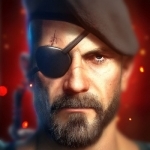
Invasion: Modern Empire
Games and Entertainment
App
Selected by Facebook as one of BEST MOBILE GAMES Invasion: Modern Empire is an online war-themed...
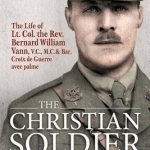
The Christian Soldier: The Life of Lt. Col. Bernard William Vann, V.C., M.C. and Bar, Croix De Guerre Avec Palmes
Book
Lieutenant Colonel the Rev Bernard William Vann, VC, MC & Bar, Croix de Guerre avec palme, was one...
